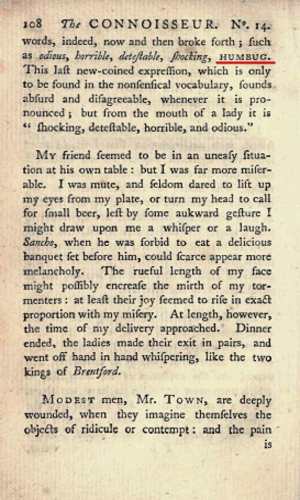We’ve all heard the famous cry from Ebenezer Scrooge: “Bah, Humbug!” It’s a word synonymous with deception, trickery, or even just grumpiness. But where did the term “humbug” originate? While many of us associate it with Charles Dickens’ A Christmas Carol, the word has a long and winding history dating back to the 18th century. Its origins remain somewhat mysterious, with theories ranging from old slang to political deceptions, and even sweets. Let’s take a closer look at this curious word and its intriguing evolution.
Origins of “Humbug”
“Humbug” first appeared in English around 1750 and quickly gained popularity, especially among those in “taste and fashion,” as noted by the Oxford English Dictionary. One of the earliest references comes from a 1750 edition of The Student, describing “humbug” as a nonsensical term favored by fashionable people. The text even critiques it as “neither an English word nor a derivative from any other language.”
While the exact root of the word is uncertain, one theory connects it to the Irish phrase uim bog, meaning “soft copper” or “worthless money.” During the reigns of James II and William III, the Dublin mint produced low-quality coins made from scrap metal. These were dubbed uim bog by the Irish, and the phrase allegedly crossed over to English as “humbug,” used to describe something worthless or deceptive.

Deception and the “Hamburg” Theory
Another popular theory ties “humbug” to the port of Hamburg, Germany. In his book The Funny Side of Physic (1874), A.D. Crabtre suggests that during Napoleon’s blockade of Britain, counterfeit currency and propaganda entered England through Hamburg. People began to associate these deceptions with the phrase “gone to Hamburg,” which eventually morphed into “humbug.” Though this theory has some merit, it overlooks the fact that the term “humbug” was already in use long before Napoleon’s time.
There’s also the suggestion that “humbug” might derive from the Latin word ambage, meaning “a tedious or winding story.” By this reasoning, humbug could be linked to the idea of convoluted lies or deceitful narratives.
“Humbug” as a Sweet Treat
Interestingly, one of the most enduring uses of the word “humbug” refers to a popular British candy. This usage dates back to the early 19th century, with references suggesting that “humbug” was a regional term for a sweet or lozenge, particularly in Yorkshire and Lancashire. A letter in Notes and Queries from 1876 recounts how humbugs were commonly sold as minty toffees or hard candies.
One famous vendor, Martha Preston (also known as “Silver-Heels”), sold humbugs and other sweets in Skipton during the 18th century. Her reputation became so well-known that she was dubbed the “humbug woman.” This sweet connection likely explains why, for many, the word “humbug” now conjures images of candy rather than deceit.
Evolution of “Humbug” in Popular Culture
The meaning of “humbug” has shifted over time. By the 19th century, it was widely used to describe any kind of deception or trickery. This is the meaning Charles Dickens popularized in A Christmas Carol. For Scrooge, Christmas was nothing more than a humbug—a fraud perpetuated by society. Dickens’ use of the term cemented its association with disingenuousness and insincerity.
Beyond Scrooge, the word has been employed in various contexts, from political speeches to everyday conversations. A classic example comes from Peter Pindar’s satirical poem A King and a Brickmaker, which describes a pompous figure who threatens violence but, in the end, does nothing. “It was all a hum,” the poem concludes—yet another instance where humbug signifies hollow words or empty threats.
Deception Behind “Hum” and “Bug”
Another theory suggests that the word “humbug” is a fusion of two older English words: “hum,” meaning to deceive, and “bug,” meaning a goblin or bogey. In this interpretation, humbug originally referred to a false scare or deception meant to frighten. This aligns with the modern understanding of humbug as a type of trickery or fraud.
This interpretation also connects “humbug” to the concept of a “humdrum” life—dull and repetitive, like the monotonous sound of a drum. The idea of “hum” as a deceptive noise and “bug” as a scary creature offers a rich, metaphorical understanding of humbug as a hollow, meaningless scare.
Enduring Legacy of “Humbug”
Despite its unclear origins, “humbug” has embedded itself in the English language as a versatile term, spanning meanings from fraud and trickery to simple sweetness. Its multifaceted history, crossing from political deception to sweetshop shelves, reflects its enduring appeal.
The next time someone cries “humbug,” whether in derision or jest, remember that they’re calling upon a word with a rich and varied history—one that has been sweet, sinister, and scornful all at once.